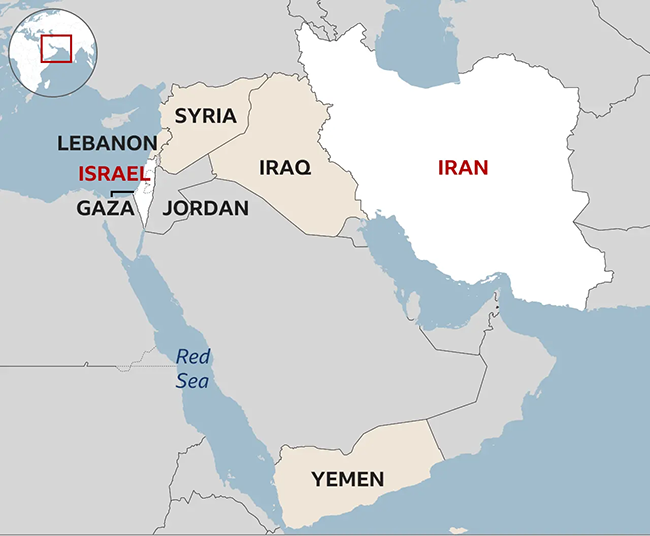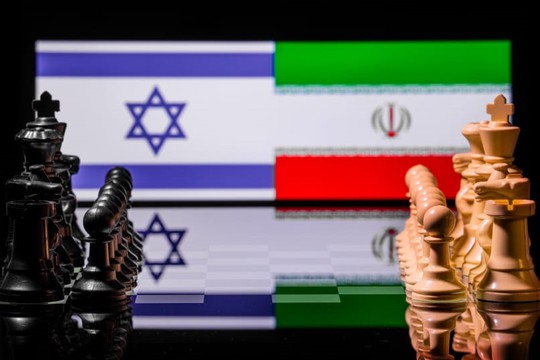A senior US official told Washington Post that the toned-down early morning Israeli strike Saturday on military targets in Iran was a “proportional strike,” which “was moderate enough to quiet the conflict without provoking Iran into a counterattack.”
However, Israeli prime minister Benjamin Netanyahu insisted in a speech on Sunday: “We hit hard Iran’s defence capabilities and its ability to produce missiles that are aimed at us. The attack in Iran was precise and powerful, and it achieved all its objectives.”
But within Israel itself, there is scepticism. Israel’s most popular news outlet Channel 12 called the operation insignificant and demonstrated Iran’s status as a major power in the region. Netanyahu has not released any reliable documentation to back up his claim, which he usually does, writes M.K. Bhadrakumar, Indian Ambassador and prominent international observer.
NourNews lampooned that Israeli psychological war against Iran has not worked. Israel hoped to stir up panic that there might be attack on Iran’s nuclear installations but normal life continues in Iran. It appears that Israel was not either inclined to carry out an extensive attack or was incapable of conducting such an operation without greater American involvement — or both. Iran’s attack on October 1 badly exposed the weakness of Israeli air defence system.
So, the bottom line is that Israel may have succeeded in conducting a limited predawn operation against Iran without excessively increasing the chances of an all-out war.
Iran will no doubt weigh the unprecedented diplomatic support from the regional states. This is a moment that Tehran cherishes, as apparent in Foreign Minister Abbas Araghchi’s words: “Since yesterday [Saturday] until now, we are regularly receiving messages from different countries, the statements they issued, the level of condemnation from different countries both in the region. It is really remarkable that it took place at this international level.”
Javad Zarif, former foreign minister and current strategic adviser to the government, also made no direct threat of retaliation, saying, “The west should move away from its outdated and dangerous paradigm. It must condemn Israel’s recent acts of aggression and join Iran in efforts to end the apartheid, genocide and violence in Palestine and Gaza, and in Lebanon. Recognising Iran’s confident resolve for peace is essential; this unique opportunity should not be missed.” [Emphasis added.]
The Israeli strike did not take Tehran by surprise. In a “scoop”, Axios reported that Israel sent a message to Iran on Friday ahead of its air strikes warning the latter not to respond in “an attempt to limit the ongoing exchange of attacks between Israel and Iran and prevent a wider escalation.”
The message from Tel Aviv conveyed through third parties “made it clear to the Iranians in advance what they [Israelis] are going to attack in general and what they are not going to attack.”
Apparently, the US pressured Israel to calibrate its proposed attack as a “proportionate response”. This becomes hugely important in the downstream, as the Biden Administration’s efforts will continue to prevent conflict between Israel and Iran escalating into a confrontation.
To be sure, Iran will press ahead on the diplomatic track. Interestingly, the Jerusalem Post newspaper highlighted that Araghchi’s hectic tours of regional capitals are “important because he is not only visiting countries that are close to Iran historically or where Iran has interests, such as Lebanon or Iraq; rather, he is doing outreach to countries that have peace with Israel and which are close to the West, such as Jordan and Egypt…
“This shows how Iran is gaining influence in Jordan and Egypt. Egypt and Iran have been on a road to reconciliation, for instance. In addition, Iran and Saudi Arabia have reconciled with China’s backing. Saudi Arabia’s Crown Prince was also in Cairo this week, illustrating how a triangle of ties between Cairo and Tehran is emerging.”
Meanwhile, Tehran will closely watch the November 5 presidential and Congressional elections in the US. In the event of a Kamala Harris presidency, the resumption of nuclear negotiations is highly likely. On the contrary, a Donald Trump presidency may presage a difficult 4-year period ahead, but here too, Russian President Vladimir Putin’s proximity with Trump to calm down tensions between Washington and Tehran should be factored in.
Trump abhors open-ended US military interventions. And Iranians are known to be highly nationalistic, and subjugating them is impossible. A prolonged war can entail US retrenchment from West Asia and the destruction of Israel — and may jeopardise Trump’s mesmerising MAGA movement.
Against such a tumultuous backdrop, what are Israel’s options? There seems to be no way out of the war in West Asia but the catch is, it won’t be the sort of war Israel is hoping for, let alone win.
Seymour Hersh wrote in Substack, “I’ve heard nothing from contacts in Beirut close to Hezbollah — whose troops are putting up a stiff fight as they did in Hezbollah’s 2006 war against Israel — that suggests anything other than a long war ahead…”
Israel is a small country. It keeps its head above the water line thanks to American money. It lacks the capacity to wage a war with Iran on its own steam.
The situation is turning into a ‘zugzwang’ in real life for Israel. Anything that Israel does will only make the situation worse, and it doesn’t have a choice not to make a choice, either.

It is apparently not much of an exaggeration to say that Israel’s attack on Iran fizzled. Some targets were hit and at least two Iranian soldiers were killed, but the ineffectiveness of the operation was probably due to several factors:
Israel just doesn’t have the weaponry. Most of its missiles don’t have the distance, and those that do, just barely so. That’s true for a lot of its drones, too, and they are too easily detected and don’t have the carrying power.
The US didn’t aid, in particular with refueling manned aircraft. It’s just as well. It would have been a good way to lose both pilots and aircraft.
Most of the nations geographically in between Israel and Iran would not permit overflights from either Israel or the US. Iran told these nations that they prefer to remain on good terms with them, and that they would consider it an act of war to lend their airspace to Israeli operations.
Iranian antiaircraft systems were apparently quite effective.
Other factors may have been involved. It is possible that cooler heads prevailed in the Israeli and US militaries, for example, but we may never know, or at least not soon. Nevertheless, the main reason that Israel did not cause more damage appears not to be a question of intention, but of capability. There’s no question that Israel was hoping for an escalation that would widen the war and force the US to enter on Israel’s side. That appears to have been avoided. Iran will have to respond, but unlike Israel, neither Iran nor the US wants escalation. Iran’s response will therefore be measured, and they will declare the matter settled.
The Netanyahu government now finds itself squarely in check, though not yet checkmated. Nevertheless, the best it can do now is probably a stalemate. This is not good in the short run for Gaza and the Palestinians, nor for Lebanon, but it’s also not good for Israel, whose population is emigrating, whose economy is tanking. Its decades of building its image as glamorous, progressive and a technological powerhouse is gone. It is now the redoubt of fanatics that even much of the international Jewish community is loathe to support.
read more in our Telegram-channel https://t.me/The_International_Affairs

 12:22 01.11.2024 •
12:22 01.11.2024 •























